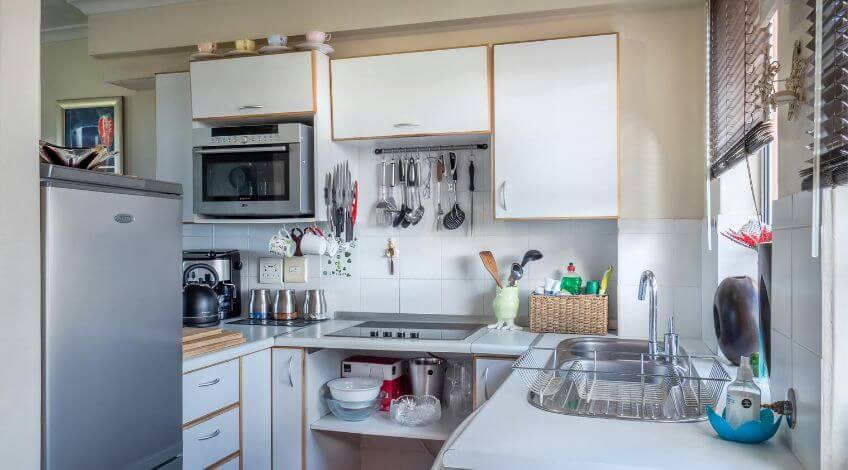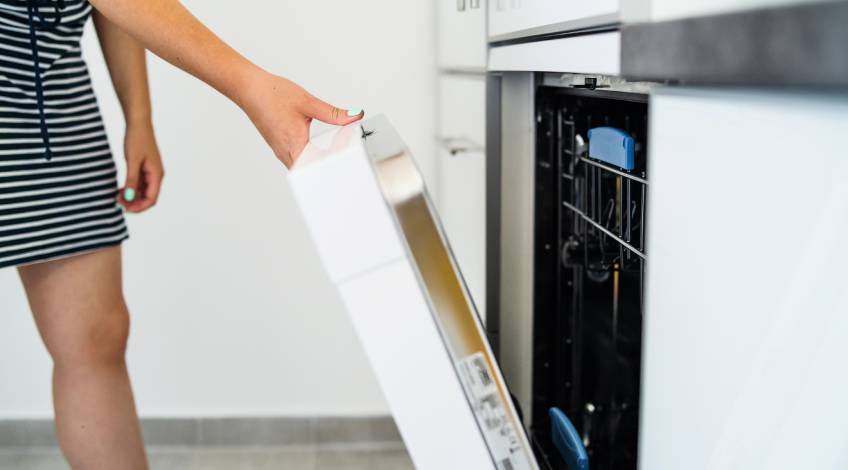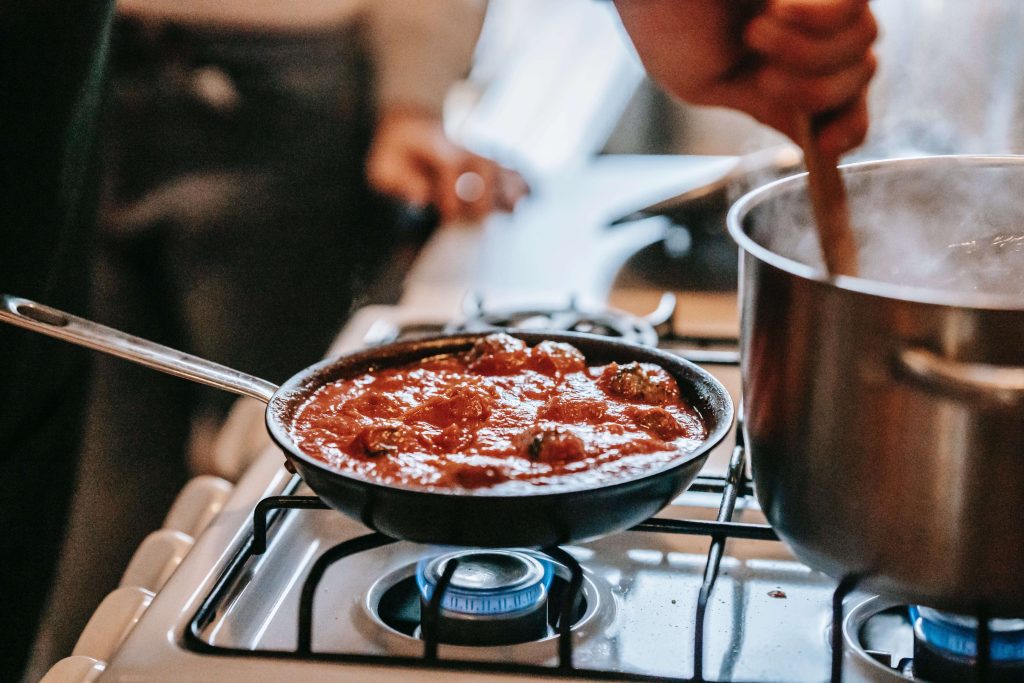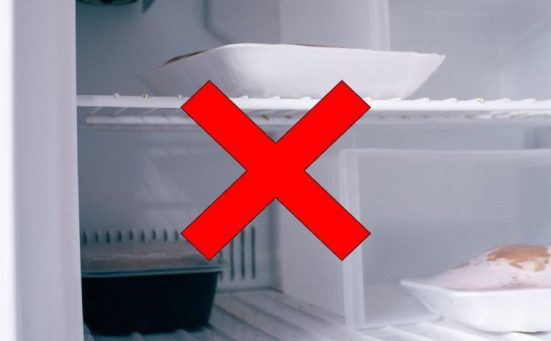
Tips To Make Your Kitchen Appliances Last Much Longer
Our kitchen appliances work tirelessly day in and day out. From the fridge that keeps our food fresh to the oven that cooks our meals, these essential helpers make our lives more convenient.
However, like any appliance, they need proper care and maintenance to keep their lifespan long!
In this article, I’ll share valuable tips to help you get the most out of your kitchen appliances, ensuring they serve you well for years to come! And of course, you’ll get bonus tips to keep your other appliances in great shape at the end.
Extend The Lifespan Of Your Kitchen Appliances – Here’s How!
Before we start, don’t worry, and let me get this straight: This is not about treating your appliances like priceless antiques to the point that you’re afraid to use them.
Instead, it’s about simple and practical tips that will save you your hard-earned money in the long run.
Let’s go!
The Dishwasher
A dishwasher is a convenient appliance that can save you time and effort, but it needs proper care to function well! Expected lifespan: 9 to 15 years
Start with regular cleaning sessions. Clean the dishwasher filter monthly to prevent food particles from clogging the system. And don’t forget to wipe the door seals to remove any food residue that could cause mould or mildew.

A friend of mine found that her dishwasher isn’t cleaning dishes properly. After checking the filter, she discovered it was clogged with food particles.
With just a quick clean, her dishwasher was back to its efficient self!
Also, make sure to:
- Use the Right Detergent: Always use detergent specifically designed for dishwashers. Using regular washing up liquid can cause excessive suds, leading to malfunctions. (I once used regular washing up liquid in a pinch, and the resulting suds overflowed onto the kitchen floor – a messy and avoidable mistake.)
- Avoid Overloading: Loading the dishwasher correctly allows water and detergent to reach all dishes, ensuring a thorough clean and preventing strain on the appliance. Think of it like this: if you cram too many clothes into a washing machine, they don’t get as clean, and the same logic applies to dishwashers.
- Check for Blockages: Inspect the spray arms and ensure they are not blocked by food particles or debris. Doing this will ensure your dishwasher cleans efficiently. A simple check can save you from having to rewash dishes that come out dirty.
The Refrigerator
Your refrigerator is one of the most critical appliances in your kitchen, working continuously to keep your food fresh. Expected lifespan: 10 to 20 years
Start with the simple stuff, which is organising food properly. Do not overfill your refrigerator, as this can block air vents and affect its cooling efficiency.

Keep food items organised to allow for proper air circulation. For example, placing larger items towards the back and smaller ones in front can help maintain airflow.
Then, do the following:
- Temperature Settings: Keep your fridge at the recommended temperature settings (usually between 3-5°C for the refrigerator and -18°C for the freezer). This ensures your food stays fresh without making the appliance work too hard!
- Check the Door Seals: Ensure the door seals are airtight to prevent cold air from escaping, which can make the fridge work harder and increase your energy bills. A simple test with a piece of paper can help – close the door on the paper and see if it pulls out easily. If it does, the seal may need replacing!
- Clean the Coils: Dust and dirt can accumulate on the condenser coils, making your refrigerator work harder and consume more energy. Clean the coils at least twice a year! (I used to notice my fridge running constantly until I realised the coils were covered in dust. After a good cleaning, it ran much quieter and used less energy.)
TIP: Make sure to read the manual for cleaning instructions! You don’t want to damage your fridge, or risk getting electrocuted!
The Microwave
Microwaves are handy for quick meals and reheating leftovers, but they need to be maintained properly to function efficiently. Expected lifespan: 7 to 10 years
Spills and splatters can cause damage if not cleaned promptly. Make sure to wipe down the interior regularly with a clean, damp, cloth.
I make it a habit to cover food with a microwave-safe cover to minimise messes, making clean-up easier!
Also, do the following:
- Avoid Metal Objects: Never place metal objects inside the microwave, as they can cause sparks and damage the appliance! My cousin learned this the hard way when she accidentally microwaved a bowl with a metal rim – sparks flew, and the microwave never worked the same again.
- Use Microwave-Safe Containers: Always use containers that are labelled microwave-safe to avoid damaging the microwave and contaminating your food. Did you know that using the right containers can prevent chemicals from leaching into your food?
- Inspect the Door Seal: A tight door seal ensures the microwave operates efficiently and safely! Check for any cracks or damage and replace the seal if necessary.
The Cooker
A cooker is essential for cooking and baking, and proper maintenance can keep it working efficiently for years! Expected lifespan: 13 to 15 years for electric, 15 to 17 for gas cookers.
As with other appliances, regularly cleaning your cooker is the key! Clean spills and splatters immediately to prevent them from burning and becoming difficult to remove.

You can always use oven cleaners periodically for a thorough clean. However, if you want the natural route, I swear by a mixture of bicarbonate of soda and water as a natural cleaner!
Just let it sit overnight and wipe it clean the next day!
- Bicarbonate Of Soda
And, do these:
- Check the Burners: For gas cookers, ensure the burners are clean and free of debris. For electric cookers, inspect the coils for any damage. I found that a simple toothbrush can be a great tool for cleaning around gas burners.
- Calibrate the Oven: If your oven seems to cook unevenly, it may need calibration. Refer to your owner’s manual for instructions or call a professional. Baking a cake that’s raw in the middle but burnt on the edges? It might be time to check your oven’s calibration.
- Avoid Slamming the Door: Slamming the oven door can cause the seals to wear out prematurely and affect the oven’s efficiency. A gentle close goes a long way in preserving your oven’s lifespan!
The Water Heater
While not always located in the kitchen, water heaters are crucial for many kitchen tasks. Proper maintenance can extend their lifespan significantly! Expected lifespan: Over 20 years for tankless, 10 to 15 years for electric, and around 10 years for gas water heaters
When it comes to water heaters, it’s important to flush the tank, as sediment can build up inside and reduce its efficiency and lifespan.
Flush your water heater at least once a year to remove this sediment. I had a friend whose water heater started making a rumbling noise, and flushing the tank cleared out the sediment and fixed the issue!
Also, doing these would help:
- Check the Pressure Relief Valve: Ensure the pressure relief valve is functioning correctly to prevent pressure build-up, which can cause the tank to burst. Regular checks can prevent potential disasters!
- Insulate the Heater: Insulating your water heater can improve its efficiency and reduce energy consumption, especially in colder climates! A simple insulation blanket can make a noticeable difference in your energy bills.
The Waste Disposal
Waste disposals can make kitchen clean-up easier, but they require regular maintenance to avoid clogs and breakdowns! Expected lifespan: 10 to 12 years
For easy maintenance, always run cold water before, during, and after using the disposal to help solidify any grease or fat, making it easier to chop up.
This practice helps keep everything flowing smoothly.
Remember to:
- Avoid Hard Materials: Do not put hard materials like bones or fibrous vegetables like celery or corn husks into the disposal as they can damage the blades. (My disposal got jammed once with potato peels.)
- Clean Regularly: Grind up ice cubes and citrus peels to clean the blades and keep the disposal smelling fresh. It’s a quick and natural way to maintain your disposal!
- Check for Leaks: Regularly inspect the disposal and the area under your sink for any signs of leaks or water damage.
Bonus Tips: How To Keep Your Other Appliances In Tiptop Shape
As promised, I wouldn’t end this article without giving you some extra tips to maintain your other appliances.
After all, who wants to throw money away by buying new when you can always take care of the existing appliances in your home? Not me!
Here you go:
Washing Machine
Washing machines are heavily used appliances that benefit from regular care. Expected lifespan: 10 to 15 years
One essential task is cleaning the drum by running an empty wash cycle with hot water and vinegar or a washing machine cleaner. I do this once a month to keep my washer smelling fresh and clean.
- 5-in-1 PROTECTION: Bacteria, Odours, Limescale, Dirt, Freshness
- KILLS 99.9 Percent OF BACTERIA: Dettol washing machine cleaner kills 99.9 Percent of bacteria
It’s also important to check the hoses regularly for any signs of wear or leaks and replace them if necessary to prevent water damage from hose failures.
Using the right detergent is crucial too. For high-efficiency (HE) washers, always use HE detergent to prevent excessive suds, which can lead to malfunctions.
After each wash, leave the door open to allow the drum to dry out, preventing mould and mildew growth. This simple step can save you from dealing with nasty smells.
SEE ALSO: How To Clean A Washing Machine Like A Pro: Quick & Easy Guide
Tumble Dryer
Tumble dryers need regular maintenance to function efficiently and safely. Expected lifespan: 10 to 13 years
Always clean the lint filter after every use to maintain airflow and prevent fire hazards. A clogged lint filter can cause your dryer to overheat and pose a fire risk.
Avoid overloading the dryer, as this can strain the motor and reduce its lifespan. Follow the manufacturer’s load recommendations – your clothes will dry faster and more evenly if you don’t overfill the dryer.
Lastly, ensure your dryer is level to avoid unnecessary wear on the drum and other components. An unlevel dryer can cause excessive noise and wear!
Air Conditioner
Air conditioners are vital for keeping your home comfortable during hot weather. Expected lifespan: 12 to 15 years
Clean or replace the filters regularly, as dirty filters can reduce efficiency and strain the system. I set a reminder to check my filters monthly during the summer.
Ensure the area around the outdoor unit is clear of debris to allow for proper airflow. Keeping plants and other obstructions away from the unit helps it operate efficiently.
Additionally, schedule regular maintenance with a professional if you don’t know how to do it yourself. This keeps your air conditioner running smoothly and catches any potential issues early.
Furnace (if you’re in US, Canada etc.)
Furnaces are crucial for heating your home, especially during colder months. Expected lifespan: 15 to 25 years
Regularly replacing or cleaning filters ensures efficient operation and good air quality. I replace my furnace filter every three months to keep the air clean and the furnace running efficiently.
Check the thermostat to ensure it is working correctly and replace the batteries if needed – a faulty thermostat can lead to uneven heating.
Inspect the blower motor for any signs of wear or dirt build-up and clean it as necessary. This simple check can prevent larger issues down the line.
Finally, have a professional inspect and service your furnace annually to keep it running efficiently and safely. Regular maintenance can extend the life of your furnace and prevent unexpected breakdowns.
And there you have it! By following these tips, you can extend the lifespan of your kitchen appliances and other household equipment, ensuring they operate efficiently and reliably for years to come!
A little bit of effort goes a long way, and who doesn’t love saving cash?
SEE ALSO: Range Cooker or Built-in Oven? (here’s how to choose)
Frequently Asked Questions
To extend the life of your kitchen appliances, follow these tips: clean them regularly, use the correct detergents, avoid overloading, check for blockages, and ensure proper maintenance like cleaning filters and coils. Simple, consistent care can significantly lengthen their lifespan.
Your kitchen appliances should last between 7 to 20 years, depending on the type. For instance, dishwashers typically last 9 to 15 years, refrigerators 10 to 20 years, and microwaves 7 to 10 years. Proper maintenance can help them reach or exceed their expected lifespans!
The kitchen appliances that last the longest are refrigerators and gas cookers. Refrigerators can last up to 20 years, while gas cookers can last 15 to 17 years. Regular maintenance and proper use contribute to their longevity.
To make your refrigerator last longer, keep it at the recommended temperature settings, clean the condenser coils twice a year, ensure the door seals are airtight, and avoid overfilling to maintain proper air circulation. Regular maintenance and mindful use will help extend its lifespan.
Yes, water tanks should be insulated. Insulating your water tank improves efficiency, reduces energy consumption, and is especially beneficial in colder climates. An insulation blanket can make a noticeable difference in performance and energy savings.
Also, follow us on Pinterest ...





